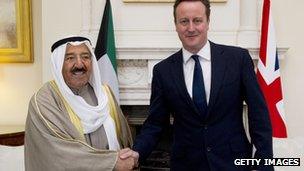UK and Kuwait to announce security partnership
- Published

The UK and Kuwait are expected to announce a major security partnership, the BBC understands.
The deal, worth up to £1.5bn ($2.4bn), comes on the second day of ruling Emir Sheikh Sabah al-Ahmad al-Jaber al-Sabah's state visit to Britain.
The UK will provide expertise in physical security, cybersecurity and counter-terrorism to the oil-rich Gulf Arab state.
It comes as Kuwait is experiencing a wave of anti-government protests.
Opposition activists are calling for the prime minister, currently appointed by the emir, to be elected.
BBC defence correspondent Frank Gardner understands that the strategic security partnership will be worth between £700m ($1.12bn) and £1.5bn.
Industry insiders say the deal, dubbed the Kuwait Security Programme, is expected to earn the UK £100-150m ($160-240m) every year for the next seven years.
Surveillance systems
The joint security programme will be run by a branch of the Foreign Office called FCO Services and will include British expertise across a range of physical and virtual threats.
A Whitehall official told the BBC that it would provide "state-of-the-art surveillance and command-and-control systems as used in the London Olympics".
During the summer, Kuwaiti officials visited the site of the London 2012 Olympics and were said to be impressed by the quality of its security infrastructure.
Kuwait, a country with one of the highest per capita GDPs in the world, now intends to use some of this British technology to protect its own key facilities.
Kuwaiti security officials have also taken a keen interest in Britain's expertise in cybersecurity and in London's Metropolitan Police command-and-control centre.
Kuwait's government and ruling emir have recently been criticised for trying to curtail peaceful protest, threatening to enact a long-moribund law that forbids public protest.
Three times in recent weeks, thousands of opposition protesters have come out onto the streets, mostly to demonstrate against a change to the election law which they believe will rig parliament in the government's favour.
Many are calling for an end to the domination of key government posts by Kuwait's ruling al-Sabah family.
There have been clashes with riot police who have used tear gas and batons to break up the protests.
On Wednesday, Amnesty International urged Britain's Prime Minister David Cameron to advise Kuwait's ruler against a crackdown on peaceful protest, saying demonstrators had the right to "voice their views without hindrance or fear of arrest".
- Published28 November 2012
- Published31 January 2006
- Published7 October 2012
- Published25 September 2012
- Published20 June 2012
- Published3 February 2012
- Published6 December 2011